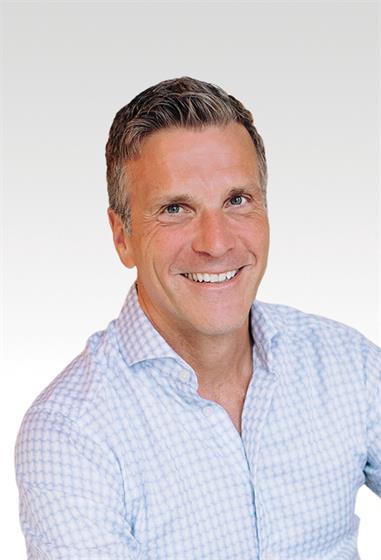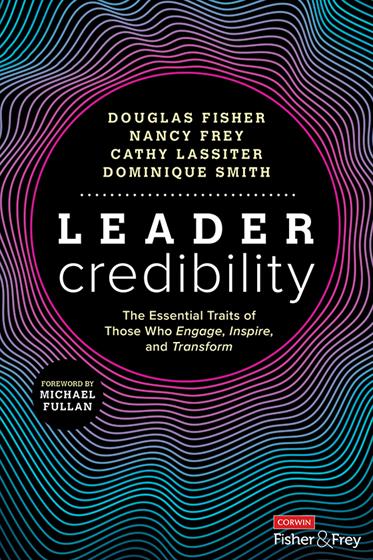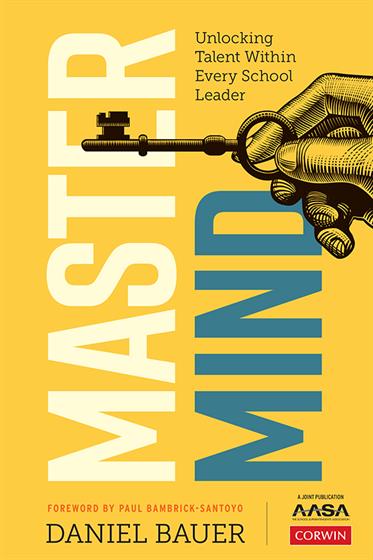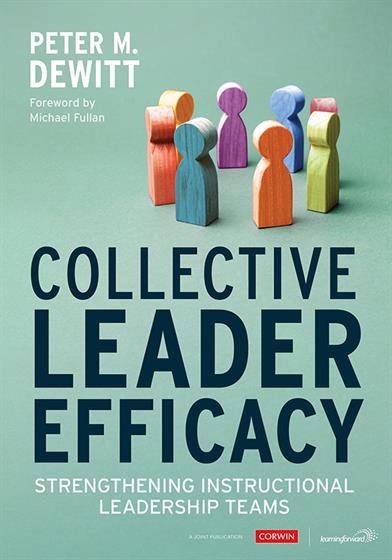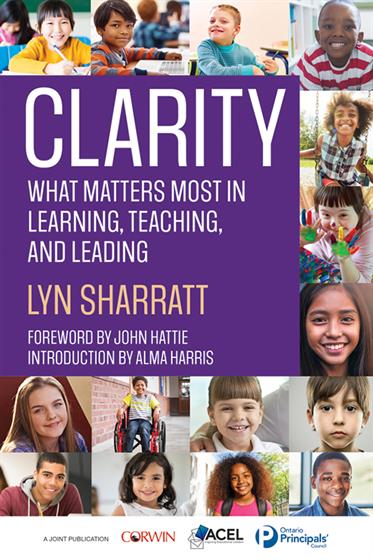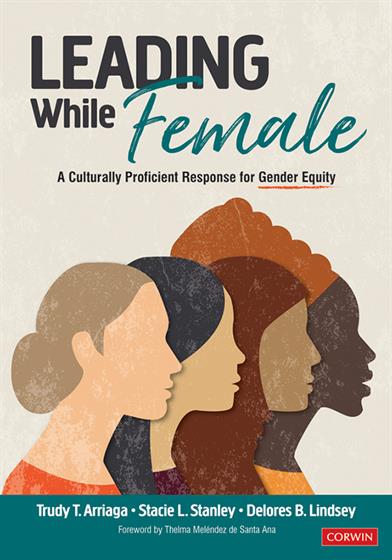Series 5 Leaders Coaching Leaders Podcast
[00:00:00.68] ANNOUNCER: Welcome to Corwin's Leaders Coaching Leaders
Podcast with host, Peter Dewitt. This podcast is from education leaders for
education leaders. Every week, Peter and our guests get together to share
ideas, put research into practice, and ensure every student is learning, not by
chance but by design.
[00:00:19.65] TANYA GHANS: Peter, hello.
[00:00:21.54] PETER DEWITT: Hey, Tanya. Good to see you again.
[00:00:23.44] TANYA GHANS: Good to see you. Episode 3, and it is bringing
all the fire that the last two did. Very excited about this.
[00:00:34.08] PETER DEWITT: I know we were saying this off air, but I feel
very fortunate to be doing this because I get that people might think, oh, he's
just saying that, but the reality is we're getting to interview people that
have an expertise that I don't have. And that's kind of cool when you can ask
them questions. And I'm not afraid of asking silly questions. If I think it's
silly, I'll say it's silly. But asking questions of people that are deeply
passionate about what they do. And our guest today, Jim Marshall, is certainly
a person who is deeply passionate about something that some people might think,
how can you be passionate about this topic? But you can talk a little bit about
Jim because he's somebody you've been working with.
[00:01:21.00] TANYA GHANS: I am, yeah. This guy loves implementation as a
quote from the podcast that is real. Yes, I had the pleasure of working closely
with James Marshall, Jim, on the book he has coming out now, well, in a few
months-- it'll be out in May-- called Right From The Start, The Essential Guide
To Implementing Initiatives In Schools. And I want to say, when I first got the
proposal, it had the words initiative and program and evaluation. And before I
got through the last word, I was falling asleep. I said, oh, God, nobody wants
to read that.
[00:01:52.56] But luckily, I'm a professional. I did my due diligence and I
kept going. And by page two, I was hooked.
[00:02:01.12] PETER DEWITT: Yeah.
[00:02:01.35] TANYA GHANS: And so I think that people who pick up this book
are going to have very much so the same experience. It's the evaluation book
you know you always wanted though you maybe you never thought you did. It
really makes plain and clear the process. And so Jim talks about his background
during the podcast itself, but he's a professor of educational leadership out
at San Diego State.
[00:02:26.50] He eats, breathes, sleeps, dreams, evaluation, has done
decades of program evaluations at many schools, over 200 of his own personal
publications. On the site, you'll see that he's really interested in the
intersection of human performance, organizational development to assess
strengths and devise strategies. But the bottom line is that he is just one heck
of a program evaluator and wanted to bring all of his intimate and expansive
knowledge to K-12 leaders because one thing that we both had, it's like really,
every great principal or school leader is a program evaluator.
[00:03:11.38] It's not something that is done to you. It's something that is
done with you and that actually you often can and maybe even should be at the
helm of. So yeah, very excited to have him on as a guest. He really does bring
a levity to what is usually a snooze fest topic.
[00:03:35.09] [BOTH CHUCKLING]
[00:03:35.99] PETER DEWITT: I love that, a snooze. Well, he credits you with
the title. And yeah, because I know I said it during the podcast, but you sent
me-- you were like, would you be interested in reading? And I was like, yeah,
sure. Because there have been times that I've had to say, hey, yeah, that's not
going to be my thing or I can't. But I opened it up, and you're right, in the
first couple of pages. So I know that people might hear implementation program
evaluation, but I promise you, you should look forward to this interview
because he has a huge depth of knowledge, but he also brings a lot of humor.
[00:04:18.23] And I just love that he explores a lot of different areas. And
like he said and people are going to hear him say, he really is a problem
solver. It's not this dry kind of thing. It's actually a lot of passion behind,
how do I help solve a consistent problem that's happening in schools around the
world, frankly? So yeah, I'm hoping people enjoy the podcast interview as much
as I did.
[00:04:46.49] TANYA GHANS: OK, I'm sure they will. So listeners, enjoy.
We'll see you on the other end.
[00:04:52.28] [MUSIC PLAYING]
[00:04:56.13] PETER DEWITT: Jim Marshall, welcome to the Leaders Coaching
Leaders Podcast.
[00:04:59.76] JIM MARSHALL: Hey, Peter. Great to be here. And thanks so much
for having me along today.
[00:05:04.81] PETER DEWITT: So why don't we just talk some basics first? So
where are you located?
[00:05:11.28] JIM MARSHALL: I hail from the great city of San Diego.
[CHUCKLES] Lived here most of my life. And I am currently a professor of
educational leadership at San Diego State University, working pretty closely
with a lot of our 43 districts in the San Diego County region, but come from a
long background of curriculum development, program design, and mostly program
evaluation.
[00:05:37.07] PETER DEWITT: Yeah, I'd like to talk a little bit about that.
I'm sure your weather is much nicer than mine is in Albany, New York right now,
but you've got a new book coming out with Corwin. And I'd actually like to be
able to start with that and then kind of back up and see what your experience
has been getting into this topic in the first place. But the book is called
Right From The Start, The Essential Guide to Implementing School Initiatives.
I've read it and I've reviewed it and I loved it. I thought it was fantastic.
[00:06:05.15] Implementation to me is just a fascinating discussion because
it just doesn't always seem to go well. Implementation is such a huge issue. So
talk to me a little bit about, where did the idea come from to write this book
in the first place?
[00:06:22.64] JIM MARSHALL: Yeah, so my background is instructional systems
design. And it really does intersect with your work in deimplementation among
other areas. But the part of it that I think is most relevant to the work is
this, that the classic instructional design model says we analyze, design,
develop, implement, and evaluate. And I think we're pretty good at design and
development. I think we fall apart at implementation because we expect, by
miracle or other higher intervention, that this perfect thing we've designed is
going to take off and do exactly what we thought it would.
[00:07:04.11] And then the final phase of the classic model is evaluation,
which I would argue happens even less than good implementation planning. So the
book is interesting and was such an exciting sort of journey to go on to
reflect both on formal training I've had, and I've taught this for decades. But
then also the thing I think we both love, which is when the ideas meet the
world, what happens?
[00:07:35.25] And my thesis basically is good implementation obviously
doesn't happen but it comes about, not only through careful design and
development of a program or an initiative, but even more importantly, front end
analysis to truly understand what's happening, what the challenge is, who's
involved, and really understand the voice of the people who the initiative is
going to affect, not to mention the organization, school district that it has
to operate in to be successful.
[00:08:12.65] PETER DEWITT: What I think is great about the book in general,
you know, I come from a leadership background. I come from being a building
principal. But you come from that program evaluation background, which I think
is really unique and it's-- I have to admit, what I enjoyed about reading the
book is not just the whole idea of the implementation and everything that goes
along with it that we'll get into, but it's also the fact that when you were
writing it, you had such an easy way of discussing what I think can be very
complicated topics.
[00:08:48.57] And that's not always easily done. And so your program
evaluation background I think is really served you very, very well. And I know
when I work with outside evaluators on work that I do, they bring a good
perspective and they talk about things that I don't necessarily consider
because sometimes you're in it so deeply that you can't see the outside. And I
think within this work, you do a really good job of being able to open people's
perspectives up a little bit about what to look for.
[00:09:23.79] So because this is the Essential Guide, one of the things that
I want to-- I just want to talk to you about your work in general. When you go
into a school district or when you're hired to go into a school district and
you do these kind of program evaluation things, structurally or maybe that's
not the best word but structurally, what do you do? Where do you start? If I
was to say, what are the five top things you do? I don't want to kind of
pressure you under that, but where do you start when you're going in to do a
program evaluation?
[00:09:58.06] JIM MARSHALL: No, that's a fantastic question. I would say the
two most common ways this happens is either proactively or reactively. So
proactively is obviously the dream scenario. I wish it was the leading
scenario, but it's unfortunately not. But proactively is often as a thought
partner in the design of an initiative or the understanding of a challenge
that's being faced, the idea is, down the road, there needs to be a program or
initiative.
[00:10:32.05] And we really want to understand it first through use of good
data, through giving voice to the people involved, and really understanding the
system in which we're operating so that we make good decisions that then will
yield predictable results for whatever we do. I would say, oftentimes, that can
be the result of pursuing grant money or other sorts of funded programs.
[00:11:00.52] But it also can be a charge from the school board or some
other sort of policy, sort of mandate that then a district or school, even a
site, is looking at, how do we do this? I say that's the dream scenario because
it's always more fun. And that might be a little selfish for me to be involved
from the beginning. Program evaluation and evaluation in general doesn't have a
very good reputation within schools, I think, at times.
[00:11:29.74] Part of that is because, often, educators think of evaluation
from the lens of their own personal evaluation and something being done to
them. I've worked my whole career to provide something done with them and that
is-- so that's my dream scenario. I will also acknowledge that many times, I
have come into a situation that is causing a big problem. It's the result of,
say, they've made multi $100,000 investment in a new curriculum, and nobody's
using it.
[00:12:08.86] You as a site leader with that background and the work you've
done in schools know it's not hard-- and I'm going to date myself-- but it's
not hard to walk into a classroom and find shrink wrap curriculum on the back
shelves that's never seen the light of day. So I've worked both with districts
who want to hasten their investments and the return on those investments. And
I've also done a fair amount of work-- believe it or not-- with publishers and
other folks who write curriculum to really understand what are essentially the
antecedents necessary for when it hits the classroom it getting used by the
educators, who it was designed for.
[00:12:52.22] But sometimes, as we both, I think, would acknowledge, we
can't fully predict the conditions of implementation. So those are kind of
typical scenarios where I've come in. My whole attitude, I've realized over the
years, is one of kind of being a fixer. I love trying to understand things and
make sense of them in new ways and then partner with people to make the situation
better and really, like I said, kind of hasten results, the best results we can
hope for.
[00:13:28.07] PETER DEWITT: See, this is why I think you just have some
fascinating experience. And when I was reading through the book, I was starting
to get a sense of that. But the idea that-- there are a couple of things that
actually just came to mind when you were talking. Number one is why do schools
get into the initiative in the first place? I'm a firm believer that sometimes
they get into initiative because they see somebody tweeted out and they're
like, oh, it's FOMO. We should be doing that. Or when I've been working with
superintendents, I gave a keynote one time and I had talked about the
implementation.
[00:14:00.60] One superintendent came up to me after and said, Peter, you
have to understand, I need to go back with a new idea or the board is going to
think that they sent me to a three-day conference where I just drank beer and
played golf. And he wasn't kidding. And I was like, oh, my gosh, therein lies
the problem. And then I've had superintendents say, listen, we have initiatives
that are tied to money and we need the money. So we're going to do the
initiative. So I totally understand where you're coming from or the reactive.
[00:14:29.25] The interesting thing about what you said though, is the idea
of working with publishers because, I mean, obviously, you know I write for
Corwin and work pretty closely with the publisher. But what does that look
like? Because I know-- let me back up a little bit-- there's research that
shows that when a researcher is actually looking at instructional strategies
and how those strategies are used in the classroom, there's a gap between them.
And I saw you shaking your head, yes, so you totally know that.
[00:15:01.60] And I often wonder if, when you're working on this curriculum
with a publisher, who is writing the curriculum and what kind of ties do they
have to a classroom so that gap isn't there? Because everybody wants to kind of
blame the teacher for not doing it when the reality is maybe the conditions
weren't set properly in the first place. Does that question make sense?
[00:15:25.29] JIM MARSHALL: Oh, my gosh, you are speaking to my soul. And
what I would just-- so first, I think it's time for a couple of disclosures. I
should throw them on the table. I did work for a publisher, a curriculum
software company in the 1990s. It was my first job out of master's school. And
we built K-6 language, arts, reading, and mathematics curriculum. And I
attended a couple of those conferences.
[00:15:55.80] I might have even spoke at them, where beer and golf were on
the agenda. So I'm familiar with that scenario and how that-- at that time, how
that worked. But here's the thing, you know, I started in this small startup
that grew pretty big and I started off as an instructional designer. Everybody
on our team was a credentialed teacher or former classroom teacher.
[00:16:25.92] And the idea was that they would have the ground truth
basically, the lived experience to allow that to intersect with the subject
matter objectives we were building to so that they were designing curriculum
that was able to be implemented. Here's the reality of the situation, it's
exactly what you just said. The conditions out in the real world vary a lot.
[00:16:59.01] And so to think that we could build one curriculum that could
be implemented exactly the same way across the entire country was ridiculous.
And so we had a huge implementation department, over 60 people, all former
classroom teachers or above, who actually would go in and partner with the
schools to implement the curriculum. And I'll end this story as quickly as I
can, but here was the fascinating thing that I think is so instructive to what
we're talking about today.
[00:17:34.75] Those consultants who were out in the field partnering with
the districts and the teachers in particular to provide professional
development came in two styles. They came in the click trainer, as I called
them, where they basically put the curriculum up on the screen, sat in a lab
and taught everybody where to click. The other flavor they came in was the,
where's your pain?
[00:17:59.14] PETER DEWITT: Yeah.
[00:17:59.83] JIM MARSHALL: We've got a huge curriculum. What is your
priority for this school year? What is the district priority? Where is the
focus at your school? What do your kids need? What do you know about them?
Predictably, the consultants who took the latter approach had the better
results. I mean, and today, I think about it more than-- I hate to say it-- 25
years later. But it's kind of one of those things where you go, well, of
course, that makes perfect sense.
[00:18:28.76] And yet, I cannot tell you how prevalent it was-- and I still
see it today-- to train to something as opposed to really think about, OK, it's
not just being able to operate this or be able to recite what I was taught in a
PD, but it's how are we going to put it to use so that it sticks?
[00:18:51.32] PETER DEWITT: I'm glad you said that because I always start
off my workshops with, what's your adaptive challenge? From Jenny Donahue and
Stephen Katz. And it's what's your adaptive challenge? And then let's see,
where does this whole idea of collective leader efficacy fit in? And those kind
of things. And you're right because I also-- being somebody that delivers
professional learning, and I try to-- most of my relationships are ongoing
every month, they're hybrid, as opposed to one and dones.
[00:19:23.12] But I'm always looking at the whole metacognitive and the
transfer of learning piece. And much of what you're talking about, I think,
when we hear implementation or implementation is flawed at a school, sometimes
it's easy to blame the school for that. And I think the onus is on all of us.
The onus is on whether it's the publisher who is publishing the book, the
writer who wrote the book, the professional learning specialist who's actually
delivering the professional learning.
[00:19:50.97] It's how are you trying to build those connections to the
situation that those schools are in already instead of just coming and say this
is going to be the panacea or this is going to be the thing that's going to
help save your life forever? I do want to ask you one question before I get
into-- I want to know the content from the book. I want people-- because this
book is more than just a book you read from beginning to end. This is a book
that you can really learn from and you can learn important steps and you can--
I mean, you looked at implementation models.
[00:20:26.64] I could tell, I'm like, this guy loves implementation because
you really worked on a lot of that. But I want to ask you a question that just
kind of popped into my mind. How do you feel about turnkey trainers? I've
worked with schools sometimes that they will have a person go to a session for
one day or maybe even, like, a half a day. And then that person is supposed to
go back and they're supposed to train everybody else. Have you ever done
research around the whole idea of turnkey training?
[00:20:56.75] Because it's something I've been looking at a lot lately and
I'm just really interested, are we setting people up for failure, especially
when it comes to implementation when we say go out and train for the day and
then come back and teach all of us?
[00:21:09.83] JIM MARSHALL: Yeah, I think that's-- I guess, in my history, I
always think of those as like train the trainer model. I've not heard the term
turnkey. But I think that's really interesting, and I think it's interesting
for this reason. Turnkey really, I would argue, tells you what's supposed to
happen. Like, this person, you're putting all the eggs in that basket and
counting on them going out. I have not seen research on that. I have evaluated
programs that use a train the trainer model.
[00:21:45.83] I would say-- and I'm going off my recollection-- I haven't
evaluated something like that recently, but I can tell you I can think of at
least three funded projects in my career where the upshot of the train the
trainer model was we needed to do more training for the trainers.
[00:22:02.81] PETER DEWITT: Yeah.
[00:22:03.56] JIM MARSHALL: And so but I think we would both agree I'm
guessing that that's another example of a practice that may be deceptively
simple because it's not just about, oh, well, get me a teacher or today we
probably say get me a teacher leader to come on over and they'll be our turnkey
trainer. And yet, the necessary requirements for that individual to be
successful in doing everything we want after they get trained is far more vast,
I think, than just saying, oh, it's a train the trainer.
[00:22:42.92] So no, I haven't really studied that in detail. I just have
looked at it as part of implementations. And I would just say what my gut has
told me that these private evaluations would do for programs was that the
investments in those individuals need to be pretty great. And selection, like
in most things, plays a role.
[00:23:06.29] PETER DEWITT: Yeah, it certainly does. So let's talk a little
bit about the book. If I'm new to the work and I've been through really bad
implementations or ones that just didn't stick as a teacher and a leader, and I
pick up right from the start The Essential Guide to Implementing School
Initiatives, what do you want people to get out of the book when they open it
up?
[00:23:31.92] JIM MARSHALL: Oh, that's such a great question, and I am
notoriously-- how do I say this? I'm notoriously short attention span to the
point where I want everybody to get everything out of everything, which has
served me well in life because I've had this range of experiences that all show
up in the book. But to be a tad more direct in my answer to your question, I
think what I would probably first and foremost want people to know, which is
kind of surprising because it's The Guide to Implementation.
[00:24:11.85] But it is truly in the process, the bookends of this
initiative sort of life cycle that I believe are critical and most missing. So
those bookends, as I mentioned earlier, are dedicated time to understand the
situation. Some people would call that needs assessment. And then program
evaluation, kind of the tail end, which really, as we've discussed, shouldn't
be the tail end.
[00:24:39.69] But it's fascinating to me how often we select an initiative
or we go out and make one without investing the front end time to really
understand what's going on. And then, even more surprising to me, is that we
make these investments and then we move on to the next one without ever
quantifying what we got from all of that work and all of that effort.
[00:25:10.86] The book is roughly chunked, if I can use that term, into the
front end planning, the design and implementation, and then guidance for
evaluation. And here's kind of an interesting fact about how the book came to
be. It did take a long time to write. And I will acknowledge, it was Doug
Fisher who told me to go write it a long time ago. But I started off writing a
program evaluation book. And even I became bored by the title and all of the
work there. And I love evaluation.
[00:25:45.82] I wake up dreaming-- I go to sleep, dreaming about it, wake up
thinking about it. But it was so obvious to me that-- I always think of needs
assessment is the yin to program evaluation yang. And any good program
evaluation is part needs assessment because it's going to tell us where to go
next and where needs are met and where they aren't. And so I really dedicated a
lot of time in the book-- like, 1/3 of the book is that front end work to truly
understand something so that you are making educated decisions around
initiatives, including how important it is for that initiative to not only sit
but thrive in the system you're introducing it to.
[00:26:36.04] I talk about white space in organizations, which is kind of on
an org chart. It's the stuff that's in between all the boxes that really is
what determines whether something works or not. It's those relationships. So
all of that comes from my own experience in seeing programs have success and
also programs not have success.
[00:26:59.51] And so I would sum it up for you by saying, in the end, what
I'd really want is for people to walk away with a set of tools that are
included in the book for doing this work that, in the end, will increase the
chances that their programs will do what they want them to do.
[00:27:18.61] PETER DEWITT: Well, I am going to say one thing, which is as
much as you got bored with writing a book when you were going to try to do
program evaluation, that is not how this book comes off. And I would be-- one,
I wouldn't have wanted you to be on the podcast if was true. I wouldn't have
reviewed it either. It's a fantastic book to read. When it comes to the whole
idea of program evaluation, is it just merely that we don't have time to do it
or we don't have the skills to do it?
[00:27:49.00] Is it skill? Is it will? Why is it that we always preach that
teachers are supposed to be looking at data to drive their own instruction, but
we don't actually look at our own data to drive the program that we're using?
[00:28:02.89] JIM MARSHALL: That's so true. And I will just tell you, and
you hopefully can tell just by talking with me, the book talks like I talk.
[00:28:12.73] PETER DEWITT: Yeah.
[00:28:13.71] JIM MARSHALL: It is very--
[00:28:14.92] PETER DEWITT: Oh, believe me, I get that. I'm understanding
that.
[00:28:20.26] JIM MARSHALL: At the risk of losing my day job, it's very
non-academic in terms of the writing, which I think is real. And that's really
who I am too, so I'm glad that the book reflects that and excited, truly. I
don't think I could write program evaluation without being a little irreverent
and maybe border on flippant occasionally. So to your question, why doesn't it
occur? Here's the thing-- and you named two possible reasons why-- I actually
think it's a twist on, we don't have the skills. But the twist is we don't
think we have the skills.
[00:29:01.30] I think a lot of times, especially leaders, and that's-- I run
a doctorate in educational leadership program. And the main people I teach are
graduate students, mostly doctoral level. And I teach them program evaluation.
And they're out leading sites and districts and all kinds of different
positions where programs and initiatives are key. But they don't realize, I
think, a lot of times that what they're doing with the student data and other
things actually is part of the program evaluation process.
[00:29:40.92] They probably do lack formal understanding of what's involved
in program evaluation, but there's so many different ways to do it. They like
to laugh at me when I teach the course because my premise to them is program
evaluation is one of the most creative endeavors in life. And they don't really
see it that way. But I'm telling you, if somebody asked me to look at a
program, there are millions of ways I could do it.
[00:30:09.78] I love trying to figure that out. And so I guess what I would
say is I think there is a skills knowledge component to why it doesn't happen.
I also think there is a confidence sort of like self-efficacy, like, I got to
have somebody else do this, somebody who knows more than me. But I've given a
number of keynotes on turning organizations into more evaluative thinking sorts
of organizations.
[00:30:39.85] And I will tell you, the last slide, every time I give that
keynote, is the Nike swoosh, saying "Just do it." So aside from my
other main tenet, which is "do no harm," I think there's always
something to learn from any size evaluation effort, as long as you're ensuring
reliable, valid data. But I think it's kind of a fear. It's that fear of I'm
not going to be successful and I don't know what I'm doing.
[00:31:10.63] And yet, just like when we turn a teacher into a professional
developer, I've noticed a lot of times, we lose learning objectives and things.
It's like, what works with the kids and you know, why wouldn't you take that
with you? I think that's similar with evaluation. it's just another spin on
understanding something using the data they have at arm's reach.
[00:31:34.54] PETER DEWITT: Yeah, I think developing success criteria is
hugely powerful to understand why you're doing it in the first place. And what
I really enjoy about the work that you're doing-- because I certainly-- I mean,
I have a two master's degrees and a doctorate, and I really do not remember
getting anything in program evaluation. And I think there's also that. So it's
great that your students do so they can-- you tell them I said that.
[00:32:01.15] JIM MARSHALL: [CHUCKLES]
[00:32:02.07]
[00:32:02.32] PETER DEWITT: But on the other side, I think, it's that balance
between management and instructional leadership.
[00:32:07.69] JIM MARSHALL: Yeah.
[00:32:09.82] PETER DEWITT: Lots of leaders feel comfortable in management.
They can tick things off their box. But when you get to that side of things,
you really kind of delving into instructional leadership and understanding
content and standards and success criteria and everything else. It's a pretty
scary place for some people. They're just not comfortable going in there. And
that's another reason why I think your book is really important, because even
if you don't have those experiences, even if you don't have that background,
you go in.
[00:32:41.84] And reading your work was a great learning experience for me.
I really deeply enjoyed reading the book and what you have in there because I
learned some things. I mean, I started writing notes and thinking, oh, I need
to think more about this when I'm running a workshop. In a weird way, I think
your work is important, not-- I shouldn't say in a weird way. In a real way,
your work is important, not just for school leaders and teachers and working
within a school district or school buildings.
[00:33:16.25] Your work is important for people that actually provide
professional learning and development because they need to understand how
they're actually laying out the information. And your book provides guidance on
that. And I think it just gives a lot of really great thoughts about what to
think about. And it honestly has changed some of my practices that I engage in
when I'm going in because you shift from-- the workshop might start at-- you
might think the learning starts at the workshop when the people come in at 8:30
and they sit down, but that's not the reality.
[00:33:54.53] This work starts way before they ever come in. So your book
really does help with that. And I think I'm glad that it took you a long time
because maybe, in that taking a long time, you certainly got it right. And I'm
glad Doug talked to you or at least twisted your arm into writing the book.
[00:34:13.67] JIM MARSHALL: Well, he's pretty persuasive. I'm sure you know
already.
[00:34:16.34] PETER DEWITT: Yeah, yeah, he is. That's true.
[00:34:18.41] JIM MARSHALL: You know, what's really interesting is I think
the time it took to write this book really is reflected in the fact that it
started off being a book on program evaluation because then when I said, no,
no, no, it needs to be comprehensive because evaluation, yeah, it's kind of the
tail end of the process, even though I've argued and firmly believe it
shouldn't. But you know, it probably took me two years to write the program
evaluation part.
[00:34:48.02] And then the other 2/3 of the book that now is there, the
needs assessment sort of grounding work and then the design and implementation
guidance, that all came about in less than six months. So that really tells you
it was like finding the right-- what should it be? What should the scope be?
And the other thing I just wanted to say because this happened to me yesterday,
I was giving a presentation to a group and I was presenting evaluation results
of a project I've been working on.
[00:35:20.48] And it was fascinating because, again, I'm used to, as a
evaluator, being seen, not the most likable guy in the room, at least-- well,
I'd like to think I'm likable once you know me, but you know, when I walk in,
it's like, oh, I'm going to get evaluated. And again, like I said, I don't believe
in doing evaluation to people. I believe in we evaluate with people as a
thought partner. But what I was saying to them was there really should be no
fear in program evaluation if we've done needs assessment because that means
we've defined the outcomes.
[00:35:59.49] So it's not somebody else saying here's what you need to do
and us having to be scared that we're not going to do it, whether it's for our
kids or whether it's PD for teachers to change practice in the classroom. But
if we've designed it, we've analyzed the challenge, we understand what's
involved, we've figured out what people need, and we've set success criteria,
then we should welcome program evaluation as the confirmation of what's gone
right.
[00:36:32.19] And I credit my senior editor Tanya Ghans, who you've worked
with, I know, as well. She's the one who pushed us towards right from the
start. And I do think it's those front end investments that pay off in the end.
[00:36:48.42] PETER DEWITT: Tanya is one of those other people who was
deeply influential. She contacted me and said, hey, I think you can write a
book on deimplementation really quick. I'm like, yeah, I don't do anything
quick. I wrote the implementation and I paid attention. She has great edits.
Yeah, we definitely don't write a book on our own, do we? The editor--
[00:37:07.20] JIM MARSHALL: She is--
[00:37:08.02] PETER DEWITT: She has great feedback so--
[00:37:10.83] JIM MARSHALL: What I love about her-- in the acknowledgments,
I said she is clairvoyantly creative.
[00:37:16.17] PETER DEWITT: Ooh, I like that.
[00:37:17.34] JIM MARSHALL: I've never met somebody who had so much
creativity but it's not abstract. It's like somehow she knows exactly what's
needed. And so--
[00:37:26.58] PETER DEWITT: Oh, yeah.
[00:37:27.48] JIM MARSHALL: --I love that. And I just would say the book is
so much better as a result of her collaboration. And most importantly, she is
senior editor with Corwin, but many years, in the classroom and leading
schools. So again, back to your earlier point, it's that voice, you know-- I
don't like to say from the trenches, but the voice of lived experience in our
schools that takes a village, I guess, to be cliche, to bring this content to
life and make it matter.
[00:38:00.44] PETER DEWITT: Well, she's pretty cool to do a podcast with
too. So--
[00:38:03.85] JIM MARSHALL: Well, I've listened to her interviewing you.
[00:38:06.65] PETER DEWITT: Yeah, exactly. That always scares me when that's
going to happen. So Jim Marshall, new book, Right From The Start, The Essential
Guide to Implementing School Initiatives. Thank you so much for being on the
Leaders Coaching Leaders Podcast.
[00:38:19.84] JIM MARSHALL: This has been fun. I appreciate the opportunity
to talk about things I'm passionate about, that we both are. So thank you for
having me.
[00:38:26.98] [MUSIC PLAYING]
[00:38:32.39] PETER DEWITT: So Tanya, I have to-- there is just so much
about what I like about Jim. I'm meeting him for the first time, so I mean, I
read his words in the book and really enjoyed the book, which I've said many
times now. But I'm meeting him for the very first time. And he had a lot of
great nuggets of information. I think his students are very fortunate to be
able to understand program evaluation because I don't think it's a topic that a
lot of school leaders get in their administration degree and sometimes even in
their doctoral work.
[00:39:06.59] So his work-- I don't want to just say the book, but his work
is really important. And one of the things that I really took away from his
writing is I want people to know that the onus is not just on teachers and
leaders to get this right because I feel like there's a lot of that. Teachers
and leaders become the dumping ground. They should do this differently. They should
do this differently. I think what he speaks to is the onus is on all of us.
[00:39:34.95] And this is something that you and I talked about with
deimplementation and I certainly wrote about it in there, but it's the idea
that, from a publishing standpoint, what are we publishing and how is this
relevant for what needs to happen within classrooms and schools? But from a
facilitator professional learning standpoint, the onus is on me to make sure
that I'm understanding the problems that the teachers and leaders are facing
who are in my room with me. And then understanding how to roll out and do those
kind of things.
[00:40:06.87] And just the idea of evaluating the program does it work
because, so often, we're engaged in programs that don't work. And either we
don't know why because we haven't questioned it or we don't know why because
we've just moved on to the next thing. And that is what contributes to
initiative fatigue. So I really see this book as a way out of that initiative
fatigue as well. So I have high hopes with it. I think he was awesome. I
thought he offered a lot within the podcast, but he certainly offers a lot
within his work as well.
[00:40:43.29] TANYA GHANS: Yeah. Thank you for even expanding and making
more global just this content and topic because it's true, this is an author
that is very passionate about this work because I think he, like all of us,
understands the-- what happens if initiatives aren't planned well is that,
ultimately, children are the ones who suffer. Time is lost. And if something is
really great, they don't get it. And that's something that we all want to
avoid.
[00:41:13.89] And so I think, the more we can arm anybody who wants to
really go out and educate people with, how do you really do that? We can unpack
what educate people means. But if there's something you want to share or give
to people, you have a responsibility to make sure you really understand what
they need. [CHUCKLES]
[00:41:33.77] PETER DEWITT: Yeah.
[00:41:35.45] TANYA GHANS: Yeah, and be open to whatever revisions and kind
of shifts that have to happen to make sure it really works in the system. One
of the lines that came up-- I always think about that as I'm listening to you
interview people-- one that stood out was he said it's so easy to underestimate
the conditions in the real world in which these kinds of programs need to
operate in. And again, as teachers, we get differentiation.
[00:42:04.76] One size does not fit all, never, never, never, does. You also
have to know the child intimately, as much as you can. It's so true. Transfer
all of the-- there are things called best practices for a reason, and they work
with all of them.
[00:42:17.51] PETER DEWITT: Yeah.
[00:42:18.29] TANYA GHANS: So you got to travel with that knowledge when the
work gets, again, more global. And I think what this practice will do, if you
completely-- if you do it with fidelity, is it will keep you fluid and flexible
and really matching the needs of what, again, the organization you're working
with, working for, working within, which is, I think, arguably 75% of the
battle of not ending up in initiative churn or fatigue or nothing happening or
it not sticking.
[00:42:54.23] PETER DEWITT: I so wish that I had this work when I was a
school leader then.
[00:43:00.51] TANYA GHANS: That is exactly the reason for why it-- on one
hand, you're like, you think everybody knows this. We're always talking about
program evaluation, but then, like you said, the results are really obvious
that we don't. And it's not about blame. It's that, hey, maybe we haven't
slowed down enough for the people who really kind of get a sense of how the
process should work to really deliver that information in a way that's
accessible.
[00:43:24.75] PETER DEWITT: Yeah, processing time is hugely important.
[00:43:27.90] TANYA GHANS: Yeah, yeah.
[00:43:29.25] PETER DEWITT: Well, I want to thank everybody for listening to
this episode. I really hope you enjoyed it as much as I did. It's just such an
interesting topic to consider because, as Jim said, it is about problem
solving. And we know that this is an issue that takes part. And it's something
that I'm walking away from the interview saying, so what do I need to do differently
about my coaching or how I facilitate workshops and all that stuff as well? So
I want to thank everybody for listening.
[00:43:59.02] If you enjoyed the podcast, please consider following us
because I think this season is just turning out to be fantastic. And if you
like what you hear, give us a rating, let us know what you think of the podcast
as well. But Tanya, always good to see you.
[00:44:17.31] TANYA GHANS: Always good to see you. Please really do leave us
a message. We want to use our data to make sure we're getting it as right as
possible.
[00:44:25.01] PETER DEWITT: Program evaluation.
[00:44:26.25] TANYA GHANS: Program evaluation. It's always great learning
alongside of you, so look forward to next time.
[00:44:31.99] PETER DEWITT: Me too. Thanks, Tanya.
[00:44:33.43] TANYA GHANS: Bye.
[00:44:34.03] [MUSIC PLAYING]




